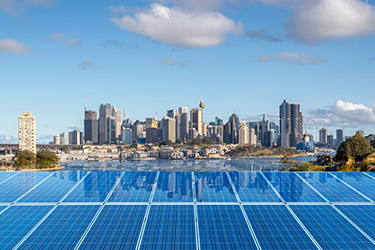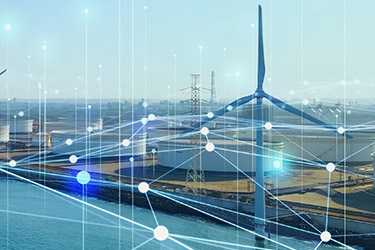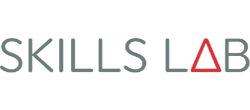The future of energy in Australia with energy expert Simon English
SAGE Automation, Published: November 22, 2019 - Updated: February 15, 2026 (5 min read)
It's no secret that the future of energy will be vastly different to how we know it today. This brings a raft of challenges for energy providers, but also plenty of new opportunities for the industry and energy consumers alike.
SAGE interviewed energy expert from Enzen, Simon English, to find out his take on what Australia's energy transformation will mean, where our energy market is headed for, and the changes it'll bring to jobs in this sector.
Transcription of interview:
"I'm Simon English and I'm currently the Smart Energy Lead at Enzen Australia."
Q: Where is Australia's energy market headed for?
"One of the exciting parts about the energy industry is that, whether it be at the home with solar and batteries, or whether it's commercial or industrial facilities which obviously scales up, or you talk about large scale renewables like wind and solar farms; the energy mix is changing as we push towards more renewables that obviously greens and decarbonises the energy industry. The challenge is that the power networks weren't designed to deal with electricity flowing up through the networks, they were only designed to deal with stuff starting at a coal-fired power station, coming back down to us as the consumer. So the consumers historically have been quite passive in the transaction of energy, and so if you move to a world - the word is 'prosumer' - if you move to a world where the consumer now can generate locally, use the energy themselves, but also can potentially sell or trade. And that doesn't necessarily mean to make money, that may mean as simple as 'I want to give my excess energy to my children who live somewhere else', or to the RSPCA or to some other charity. That changes, completely, the way our energy system works.
Q: What will the energy jobs of the future look like?
"So, I think one of the biggest changes is that we're going to have a flood of data. So, electricity will actually be less important in the context of, I say, value. The value will be in the information. So, associated with in your home, for example, associated with that battery and solar panel isn't just that does - electricity - but it's your energy patterns in the home, the state of charge, the performance of that information. So that unlocks a whole raft of new jobs, because you have to maintain those assets. So we've now got this digital, battery, PV kind of world, that we're going to need different types of technicians, you know, is it the super sparky? Or is it some other form of you know, technology person? Those devices talk on the internet so it's about communications, it's about data, data modelling. And then of course you have, once that data's available, it's going to unlock a whole range of new technologies - you've probably heard the term 'blockchain' right? But it's just one of many different technologies that we utilise about how we manage information. So in that sort of 'digitisation' sort of world, you're going to see a whole raft of new jobs created with people who are focussing on how you use the data, how you move the data around, how you aggregate, how you use artificial intelligence on the data to make better decisions - so really it's about the data."
Q: Will 'smart electricians' become the norm?
"Oh, I definitely think so, yes. You think about the way the world works today, the electricity industry at a basic distribution to the power industry network, and then at the home in business industrial. It's all pretty same, it's all very regulated, standarised through AS3000. It's all very prescriptive. You're moving to a world where every device, whether it be the home or industry, will have an embedded controller in it, will have electronics, will have some form of web-faced interface data. So that electrician, if they're going to work on that device now, the problems they're going to be solving, sure might be electrical, but they might also be electronic. But they're more likely to be communications related or 'I can't talk to the web server' or 'these two systems aren't communicating because of some data issue'. So, a very different skillset. So yeah, I find it interesting how people go 'oh, jobs will be automated away'...who looks after the automation? The automation will need to be maintained and that's where that role will, that 'super electrician' will be you know, in their element."
Q: What opportunities does this new energy model create?
As well as unlocking opportunities, I think one of the key things the energies will create is there'll be a whole bunch of new entrants. So there's always been that sort of 'Uber' concept, people saying 'oh well, when an Uber comes into the power industry'. But before we even get there, you'll see, I think you'll see some really creative solutions about energy. So, the analogy I give to people is 'if electricity flows within a local community, so it flows at the street level or at the local town community level, and really sort of a self-sufficient concept of a micro-grid, that unlocks a whole new set of business models about how that electricity is used. And it becomes effectively a new, almost a new economic simulator. And so there'll be lots of new industries built on the back of the energy being available in the local community, and not having to source it from you know, the market or from a big, coal-fired power station. So, if you think about things like 3D printing, in a small community or in the home, being self-sufficient, if your energy costs can drop significantly because it's available locally in the community, then it unlocks a whole range of new economic prospects, so energy becomes the enabler, and I think that's really important. That seems to be lost a little bit, I think, in this energy conversation. Everyone's going 'doom and gloom', 'what are the networks going to do?' 'what are transmission companies going to spend lots of money?' What they're not doing is going 'if I actually have power decentralised throughout my, you now, through the communities of Australia, what does that do to the economy? What value could that unlock?' And I think we're going to see some incredible things in the next ten years."
SAGE is creating a smarter, more sustainable future for South Australia, through SA Water's Zero Cost Energy Project:









